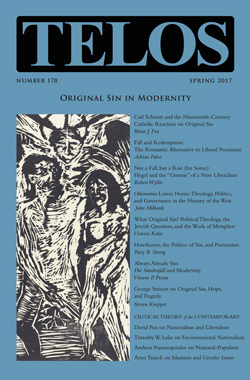Telos 178 (Spring 2017) is now available for purchase in our store.
 “If men were angels, no government would be necessary,” James Madison famously writes in Federalist No. 51. The defectiveness of the human will and the human intellect make government necessary, whether in John Calvin’s Sermon on the Galatians, which Madison echoes, in the locus classicus of this argument, Augustine’s City of God, or in book 9 of Plato’s Laws, which already describes humans’ innate capacity for evil as “a result of crimes long ago.” In modernity, Christian tropes like the Fall and original sin are used not only to justify political power, but also to temper utopian political goals. Reinhold Niebuhr emphasized the latter, for example, when he described the preference of the United States’ purportedly “Calvinist fathers” for relying upon checks and balances rather than the intelligence and goodwill of future American statesmen. Even the most familiar political analyses of original sin and the anthropology of Western Christianity contain this tension between justifying and limiting political power.
“If men were angels, no government would be necessary,” James Madison famously writes in Federalist No. 51. The defectiveness of the human will and the human intellect make government necessary, whether in John Calvin’s Sermon on the Galatians, which Madison echoes, in the locus classicus of this argument, Augustine’s City of God, or in book 9 of Plato’s Laws, which already describes humans’ innate capacity for evil as “a result of crimes long ago.” In modernity, Christian tropes like the Fall and original sin are used not only to justify political power, but also to temper utopian political goals. Reinhold Niebuhr emphasized the latter, for example, when he described the preference of the United States’ purportedly “Calvinist fathers” for relying upon checks and balances rather than the intelligence and goodwill of future American statesmen. Even the most familiar political analyses of original sin and the anthropology of Western Christianity contain this tension between justifying and limiting political power.


